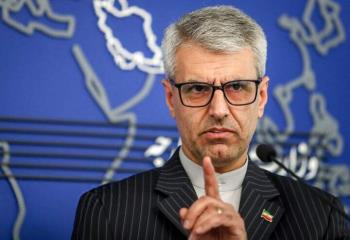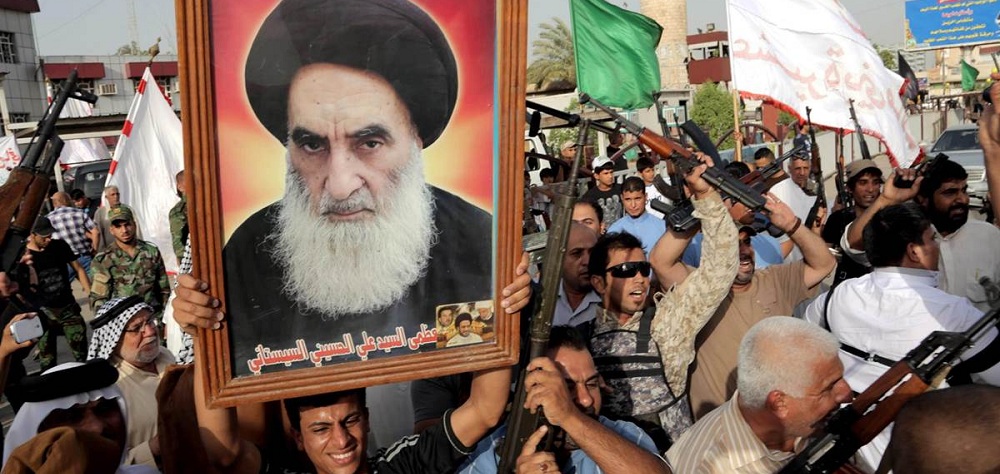Alwaght- When Ayatollah Sayyed Ali al-Sistani issued a fatwa for recruitment and jihad against ISIS terrorist group in 2014, within a short time hundreds of thousands responded affirmatively and headed to the battlegrounds, tipping the scales to the detriment of the terrorist fighters. The preliminary nucleus of the newly-founded Popular Mobilization Forces (PMF) was Shiite but shortly later, tens of thousands of others from various sectarian and religious groups joined in defense of their country in the face of terrorism.
Appreciating the Shiite religious authority (marjaeya)
This year too, the PMF officials at the voluntary organization's foundation anniversary pointed to its efforts and achievements in the past eight years. Its chair Faleh al-Fayyadh said on Monday that the fatwa issued by Ayatollah al-Sistani changed the course of developments. He referred to the foreign conspiracies against the organization, adding that it had stood firm despite all the plots and continued defense of the country alongside other security and armed forces. Al-Fayyadh added that the PMF, called Hashd al-Shaabi in Arabic, stands against corruption, enslavement, and humiliation, and does not approve of an Iraq not governing itself.
Sayyed Ammar al-Hakim, the head of national wisdom party, in an address shed light on the educational aspect of the Hashd's foundation. He held that the fatwa was unifying to all Iraqi sects and faiths and even political tendencies. "Thanks to this unity, they managed to obliterate terrorism, return the conditions to normal, and free the nation's soil from the villains."
Ahmad al-Asadi, spokesman to the Fatah coalition and one of the commanders of Hashd, praised Ayatollah al-Sistani for the fatwa leading to foundation of the organization and said that it has been responsible for defending the country and everything related to its future generations. Emphasizing that the organization is not limited to religion, sect or race and will remain the most important security institution and pillar of security in Iraq, he noted that it is a red line that will not be subject to any political debate or sharing.
The role of the Shiite religious authority in establishing the PMF and the services that the organization has provided in recent years make even its opponents acknowledge this role in passing the terrorism crisis.
Prime Minister Mustafa al-Kadhimi in a tweet said that Ayatollah al-Sistani's fatwa changed the retreat to advance and defeat to victory. This fatwa came to help the heroic forces of the nation and revealed their steady resolve, will, and belief and imposed defeat and obliteration on the terrorists.
"We remember with respect the fatwa of jihad by Ayatollah al-Sistani that was issued in a crucial moment. It should be deeply studied because it was a genuinely patriotic plan saving Iraq from terrorism," said President Barham Salih in a statement.
Iraqi officials in their speeches repeatedly admitted that without Ayatollah al-Sistani's fatwa, Baghdad could fall to ISIS as the army had lost the power and initiative to counter the terrorists and it was the popular forces that pushed back the terrorist fighters.
The PMF's successes have shown the impact of the Iraqi marjaeya, and now that it is the eighth year of its establishment, the importance of this historic fatwa has become even more obvious. This shows the fact that the marjaeya is key for maintaining peace, stability, and security in Iraq, to an extent that it guarantees the protection of the country against threats in crucial situations. Unlike political factions, Ayatollah al-Sistani does not have a sectarian view of the people and developments in this country. Rather, his view is nationalistic and within the framework of the country's sovereignty and emphasis on the unity of Shiites and Sunnis. This view is important in his popular acceptance and efficiency of his role in sensitive junctures of Iraqi developments.
PMF, a guarantee to Iraq's security against ISIS remnants
Although the West and its regional pawns have struggled to prevent the PMF's influence gain in Iraq, they failed, as over time it became clear that foundation of the popular organization was an auspicious move with great fruits to the security of the country.
Eight years after its foundation, the organization continues to be a major force in defending Iraq's security and stability against ISIS sleeper cells and to counter foreign conspiracies to revive the terrorist group in western Iraq. Although the core of ISIS was destroyed by the PMF forces in 2017, secret elements of the group occasionally try to rebuild their power through terrorist operations and attacks on security and government centers. But the PMF do not allow the Takfiris to re-mobilize as they clash with them and deal hard blows to them frequently. In addition to presence on the fronts, the PMF participates in reconstruction of areas damaged during fight against terrorism. Many of the homes and roads destroyed by the war were reconstructed by the organization.
They are also doing well in the areas whose security is entrusted to them. In addition to providing security in various parts of Iraq, these forces also play an important role in protecting the lives and property of the people on Iraqi national and religious occasions, such as the Arbaeen marches, in which millions of people from all over the world travel to Iraq.
PMF defense of national sovereignty
The PMF's performance in defense of the territorial integrity and national sovereignty against the foreign occupation forces and separatist groups is as dazzling as their performance on the battlegrounds.
One historic motion is expulsion of the American forces from the county. The PMF acted both legally against the American occupation by pushing for expulsion bill and operationally by severely restricting their movement in the country.
The PMF commanders have repeatedly warned that if the US does not pull out, they resort to force to expel them. It was because of PMF warnings that Washington handed over its military bases to Baghdad and concentrated all of its forces in two or three. The White House sees the organization as a major obstacle to advancing its destructive plans in Iraq, and in addition to media propaganda, US fighter jets occasionally targeted the Hashd bases in the past two years. Responses to these attacks came fast in Iraq and Syria against the American bases.
Additional American measures range from inciting street protests to pressures on the government for disarmament of the PMF and prolonging the political stalemate in Iraq to paint the resistance groups within the organization as the factors behind the disorder. But the PMF leaders are well aware of these plots and foil Washington and its allies' evil moves.
In addition to resistance to the US, the PMF stands against frequent Turkish violation of Iraqi sovereignty after decades of inaction by Baghdad. Reacting to stepped up attacks by Turkey over the past few months in the north, the organization warned of "tough lessons" to Ankara if the latter does not stop its incursions. Rocket attacks on Turkish bases in recent weeks are warning messages for Turkey to withdraw its troops.
Respect to law and democracy
While its opponents claim the PMF considers itself above the law and is a force beyond the law's control, in addition to military services, it has been a frontrunner in contributing to realization of political stability.
Firstly, the organization always abides by parliamentary laws and judicial and executive rulings. An example is the order to merge the PMF into the regular armed forces by Prime Minister Adel Abdul Mahdi. Its commanders fully complied with the measure.
Secondly, having in mind that some lawmakers are close to the PMF, the organization works with other political parties out of a patriotic view and prioritization of the national interests to end the political limbo in the country. Various meetings with Sadrist Movement and Kurdistan region's officials are meant to settle the political crisis.
As part of this approach, the PMF Deputy Chief of Staff for Operations Yasser Al-Issawi told Al-Mayadeen that the organization would not allow military coup or political developments out of the framework of the elections.
Successful eight-year experience shows that if it was not for Ayatollah al-Sistani's foresight and fatwa, ISIS obliteration could be a decade-long project and the country could not get rid of terrorist group this soon. Thanks to its bright record of anti-ISIS combat and popular activities, the PMF is now one of the most influential military and social institutions and the psychological warfare by the Western-Arab camp to undermine and even disband it can not easily damage its popular and political position.



























